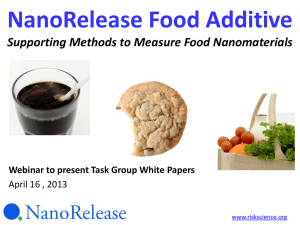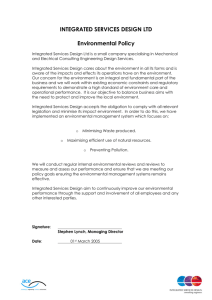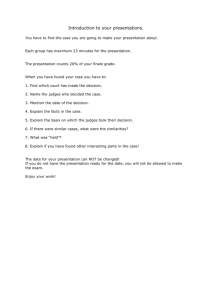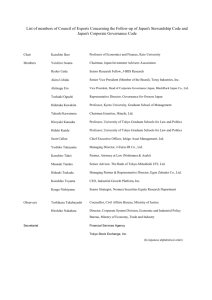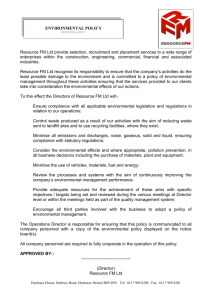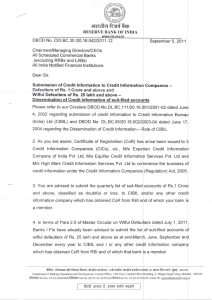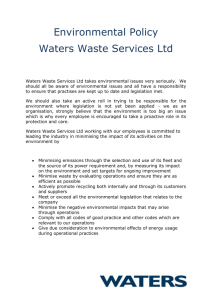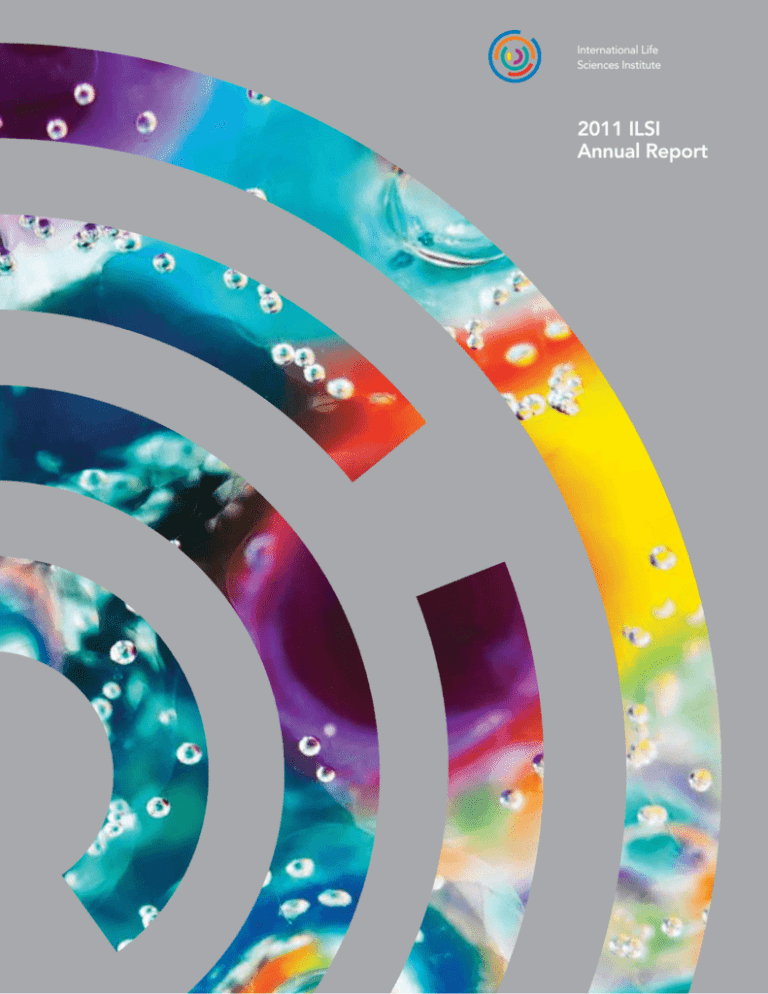
International Life
Sciences Institute
2011 ILSI
Annual Report
2 Letters from the President and Chair
12 Global Issue: Obesity
4 Global Issue: Water
15 2011 ILSI Board of Trustees
6 Global Issue: Risk Assessment
16 2011 ILSI Members
8 Global Issue: Biotechnology
20 2011 Revenue and Expenses
10 Global Issue: Functional Foods
ILSI believes scientists from industry,
academia, and government can and should
work together in an open, transparent manner.
The collaborative nature of our work – which
is part of the larger body of scientific evidence –
helps industries make safe, healthy products and
helps governments provide effective and practical
guidance to ensure public health and well-being
and environmental safety.
Fresh. Energetic. Bold.
ILSI adopted a new logo in 2011 –
While logo interpretation is often
The fresh, bold, and energetic logo is
one designed to catch the eye
subjective, the abstract nature of
an effective tool to catch attention and
and convey the dynamism of
the symbol has underlying meaning.
build recognition of our contribution
the organization. It reflects the
The concentric circles simultaneously
to the science that helps makes the
enthusiasm we have for our mission
portray a stylized plasmid map
world a better place. Its implementation
to deliver science that leads to a
signifying our focus on the life
online and in print is part of an
healthier world.
sciences and a world globe
ongoing communications strategy
representing our international reach.
to raise awareness of ILSI’s value within
The way in which the individual lines
the scientific community.
work together to create a whole
expresses our commitment to
collaboration and is an emblem of
the synergy of our work among
ILSI entities and with our partners.
From the President
T
Peter van Bladeren, PhD
President
International Life Sciences Institute
he central challenge laid out in the ILSI strategic plan
is to “enhance ILSI’s scientific contribution to improve
human health and the environment.” ILSI strives to achieve
this goal by continually examining how well our scientific
portfolio is meeting important health and environmental
concerns. Our Global Issues – common topics of interest
across ILSI entities and featured in this annual report – are
how we prioritize the science to meet this central challenge.
In 2011, we added Water to our existing issues: Risk
Assessment; Biotechnology; Functional Foods; and Obesity. This is
a response to the global threat of diminishing sources of safe water,
and our programs are being designed to help achieve cost-effective
sustainability for drinking water and food production.
Another goal outlined in our strategic plan is to become a preferred
resource for science; that is, to be recognized for delivering quality,
useful science. While the Five Global Issues structure allows us to
manage our dynamic scientific portfolio, proactive communications
is making people aware of our role in today’s important issues and in
getting the science into the hands of the people who make decisions
affecting the health and well-being of all of us.
As part of this invigorated communications effort, ILSI has adopted
a bold new logo – one that catches and keeps attention. Also, many
branches are taking the initiative to reach out to new audiences
in creative ways. ILSI Europe and ILSI Brasil are examples where
the media is being engaged to effectively raise awareness of ILSI’s
scientific products. The quantitative results are illustrative; in the
past two years our website has gone from having about 1,000 visits
per month to an average of 9,000 hits per month. Every week we
receive requests to join our newsletter distribution list from our core
audiences: scientists in academia; government; and industry.
Our objective for 2012 is to accelerate this communications
momentum. The bright logo, an assertive and coordinated communications effort across ILSI entities, and a foundation of excellent
science will further position ILSI as a go-to scientific organization.
2
From the Chair
I
Sushila Chang, PhD
Chair
ILSI Board of Trustees
LSI’s global network is one of our greatest assets.
Our branches, international committees, and the
Research Foundation work at the national, regional,
and international level allowing ILSI to nurture
partnerships and foster collaboration at the very local
level and the global level simultaneously and seamlessly.
You can see this in the joint programs we develop
between entities and with the external partners we have
“on the ground,” as they say.
International collaboration – true collaboration where more than
one partner shares in the process for designing, implementing,
and funding programs – is hard work. It requires patience,
dedication, and sometimes finesse to establish a partnership and
maintain it. This is why another of our greatest assets is our staff.
It takes the perseverance and creativity of committed individuals
to recognize opportunities, to mobilize resources, and assist our
volunteer leadership in taking full advantage of prospects for
forging new partnerships and expanding existing relationships,
and all this across time zones. Therefore, in 2011, the ILSI Board of
Trustees made a commitment to help staff help each other grow.
We instituted a grants process by which we can support an exchange
program. Staff from one branch will spend time at another branch
sharing ideas and learning new ways of approaching their work. The
exchange is designed so both the visiting branch and the hosting
branch benefit from a cross-fertilization of ideas, whether it be on
basic project management, on communications, or on fostering
meaningful collaboration. In addition to the hands-on learning it
provides, the exchange creates lasting relationships in themselves.
It brings branches closer together and makes cooperation more
second nature.
Several members have already given generously to fund the exchange
and we hope more will do the same. The program meets a tenet of
the ILSI strategic plan to build staff capacity at all levels. It also invests
in people – for the sake of the organization but also for the sake of the
individual his or herself. It is a way to strengthen the skills of the very
people who make ILSI strong.
I look forward to the success stories stemming from this exciting
exchange program.
3
Water Sustainability for
Drinking and Food Production
T
he ILSI Board of Trustees
identifies health and
scientific topics of common
concern or interest. These
are issues affecting millions of
people in all parts of the world.
The Board refers to these as
“Global Issues” – broadly
defined categories used to
track how ILSI’s work is improving
our scientific understanding of today’s
important concerns.
Previously, the ILSI Board defined
four Global Issues: Risk Assessment;
Biotechnology; Functional Foods; and
Obesity. In 2011, the Board added a
new issue: Water.
Although ILSI’s work on water issues is
not new, the Board of Trustees elevated
the topic as access to clean water has
become as a more critical, global health
problem in recent years. National
governments and international health
agencies are increasingly worried about
shortages of water and inadequate
water sanitation in urban and rural
settings. More recently, the food and
beverage industries are concerned
about barriers to sustaining safe water
supplies, which is due in part to a lack
of best practices in the application of
current technology; out-dated science
policy on risks; confounding national
and political pressures for water use;
and even perceptions of what kind
of water can be used in what ways.
ILSI programs, both existing and new,
are designed to bring together health
and technical experts from a range of
disciplines to work to fully understand
the situation on local, regional, and
international scales so appropriate
solutions can be implemented.
ILSI Europe Leads a Global
outline for an overview publication,
ILSI Europe is building a broad
Initiative on Water
which is in development and
coalition of program partners. Eight
ILSI Europe established a new
expected to be published in 2012.
ILSI branches (India, Japan, Korea,
program on water known as
The publication looks at fresh produce
México, North Andean, South Andean,
“Water and Sanitation Perspectives.”
and microbial safety concerns; the
South Africa, and Southeast Asia
While the program is comprehensive,
quality of irrigation waters used in fresh
Region) are collaborating with
an initial focus has been set on the
produce production; microbial hazards
ILSI Europe. The World Health
quality of water used in the production
linked to irrigation and process waters;
Organization and the Food and
of fresh produce. In March 2011,
and microbial risk assessment. The
Agriculture Organization of the
ILSI Europe convened a meeting to
publication will provide a scientific gap
United Nations are providing technical
define the scope of activities and the
analysis and make recommendations
support. Representatives from these
shared responsibilities among the
for next steps.
groups and additional ones, such as
initiative’s participants and supporters.
the International Water Association and
The meeting resulted in a specific
the International Water Management
Institute, serve on an Advisory Group
to the initiative.
4
Innovation in Water Reuse in
The guidelines, developed by a panel
the Bottling Industry
of experts, will lead to reductions in
In 2011, the ILSI Research Foundation’s
the bottling industry’s water footprint
Center for Risk Science Innovation and
(total liters of water required to produce
Application launched a water program
a liter of product) by guiding the
designed to apply new and sometimes
application of monitoring and safety
innovative engineering, monitoring,
evaluation protocols for purification
and risk management approaches to
processes and technologies that
the reduction of water use in the food
have so far only been used in pilot or
and beverage industry. An initial project
experimental applications.
focuses on establishing guidelines for
water reuse in the bottling industry.
5
Changing the Philosophy
Behind Risk Assessment
T
hroughout 2011, the ILSI
Health and Environmental
Sciences Institute (HESI) built
momentum on its initiative to
improve how risk assessment
is conducted: Risk Assessment
for the 21st Century (RISK21).
This effort, with the potential
for far-reaching impact, seeks
to improve human and environmental
health by fundamentally shifting the
focus of risk assessment to thinking
about the problem that needs to be
addressed first, followed by leveraging
existing information; conducting
additional toxicology testing and
gathering more exposure information
when needed; and incorporating new
methods into the risk assessment process.
6
This shift places emphasis on problem
formulation – i.e., thinking about the
problem that needs to be addressed first.
Problem formulation defines the scope
of an exposure and effect of concern
and the objectives for addressing them,
and generates and evaluates preliminary
hypotheses to address the concern.
Problem formulation first uses existing
information to help inform the risk
assessment and applies new methods to
the risk assessment whenever available
and appropriate. RISK21 views problem
formulation as an iterative process
that identifies data gaps and leads to
full understanding of a necessary level
of certainty.
Problem formulation is key to RISK21’s
mission to bring applicable, accurate,
and resource appropriate approaches to
an evolving world of human health risk
assessment.
In 2011, HESI held a workshop and
presented at the International Society of
Exposure Science to educate audiences
about RISK21 and to get feedback from
diverse stakeholders on the project’s
goals and how to achieve them. With
over 50 participating organizations from
academia, government, and industry,
RISK21 epitomizes HESI’s commitment
to the tripartite approach to generating
scientific knowledge.
In 2012, HESI will work with its
partners on case studies designed
to validate the effectiveness of the
paradigm shift RISK21 represents.
Risk Management Harmonization
national, regional, and international
A Risk from Risk Perception?
In today’s globalized world, the
stakeholders. ILSI Southeast Asia
The Research Foundation’s Center for
movement of agricultural products
Region’s 2011 seminar “Food
Risk Science Innovation and Application
and food across national borders
Contaminants: Emerging Issues
(RSIA) examined the unintended
creates a shared responsibility for
and Risk Management Strategies”
consequences of the perception of risk
public health and safety. Whether
brought together industry and
(versus actual risk) on decision making.
potential contamination is intentional
government decision-makers to
Recognizing human perception of risk
or unintended, governments, industries,
discuss common concerns about
can lead to behavior that reduces health
and important world bodies such
the prevention and management
risk (avoids a risk); increases health risk
as the World Health Organization
of chemical and microbial food
(replaces an avoided risk with something
must cooperate on setting standards
contamination. In conjunction with
riskier); or does not affect health risk
and risk assessment methods for
this event, ILSI Southeast Asia
but has adverse economic effects,
harmonized approaches. ILSI
facilitated the “9th ASEAN Food
RSIA convened a 2011 workshop on risk
Southeast Asia Region has been a
Safety Standards Harmonization
perception. RSIA gathered risk assessment,
leader in promoting the importance of
Workshop,” where industry, academic,
risk policy, and economics experts
harmonization throughout Southeast
and ASEAN country representatives
from academia, government, industry,
Asia and Australasia and in facilitating
discussed how to fill scientific gaps im-
and nongovernmental organizations to
the exchange of perspectives among
peding the progress of harmonization.
explore public health risks stemming
from errant perceptions of risk.
The workshop spurred interest in
case studies, to be initiated in 2012,
which will further help identify, assess,
and address public health risk from
perceptions of risk.
RISK21’s efforts will lead to the ability to assess more
exposure situations, toxicity scenarios, and chemicals
with existing resources; use far fewer animals in animal
testing; and reduce the number of false positive
and false negatives while simultaneously increasing
confidence in the risk assessment.
7
International Colloboration
on Biotechnology
T
he ILSI Research
Foundation’s Center for
Environmental Risk Assessment
(CERA) is providing technical
support to the Government of
India as it works to establish
an appropriate framework for
conducting environmental risk
assessment (ERA) of genetically
engineered (GE) plants in India. The
approach has been to assess the vast
international experience in ERA, focusing
on the scientific aspects of ERA versus
policy or political considerations, so
India can develop country-appropriate
ERA guidance based on established
principles and tested methods.
ILSI’s biotechnology programs address scientific
issues related to the safe development and
distribution of products derived from modern
agricultural biotechnologies.
Success through Collaboration
with ILSI Southeast Asia Region,
workshops with ILSI Mexico, ILSI North
Biotechnology is an area where ILSI
ILSI Korea, and ILSI India to examine
Andean, ILSI South Andean, ILSI Korea
is especially successful in collaborating
the latest developments in sampling
and ILSI Japan; events that brought
across entities. Led by the ILSI
and detection methods. It also
together regulators, academic experts,
International Food Biotechnology
presented at a workshop organized
and industry scientists to discuss
Committee’s (IFBiC) commitment to
by the ILSI Health and Environmental
improving systematic approaches to
scientific outreach and capacity
Sciences Institute and ILSI Focal Point
the environmental risk assessment
building, and the ILSI Research
in China on the use of mammalian
(ERA) of genetically engineered
Foundation’s focus on creating
toxicology studies in the safety assess-
plants. CERA is also working with
sustainable partnerships, ILSI and its
ment of whole foods from genetically
ILSI Argentina on a multi-year research
branches have been able to connect
engineered crops. The ILSI Research
project exploring the issue of data
local thought leaders and international
Foundation, through the Foundation’s
transportability in ERA.
experts throughout 2011. IFBiC worked
Center for Environmental Risk
Assessment (CERA), co-organized
8
In 2011, this collaboration included
the seminal “South Asia Conference on
Current Approaches to Environmental
Risk Assessment of Genetically
Engineered Crops.” This important
three-day event, which included
symposia and a technical workshop,
was organized by CERA and Biotech
Consortium India Limited with
support from the Indian government’s
Department of Biotechnology and
Ministry of Environment and Forests,
and the United States Agency for
International Development.
The conference succeeded in its goal to
bring together scientists and professionals
from India and abroad to discuss in detail
the science and the practice of ERA.
Case studies of experience with ERA
in Australia, India, The Philippines,
and other countries set the stage for the
discussions and established basic points
of agreement. This included recognition
that the science of ERA remains largely
the same from country to country and
that ERA harmonization across national
borders can be achieved.
Technical sessions then addressed the
importance of problem formulation
as the essential first step in ERA; field
trial data collection and interpretation;
understanding gene flow; post release
environmental surveillance; and insect
resistance management. Panel sessions
were used to review horizontal gene
transfer; the use of antibiotic resistance
genes as selectable markers in GE plant
development; and management of
herbicide tolerance.
The case studies, technical sessions, and
panel discussions exposed participants
from Indian Central and State governments; state agricultural universities;
research institutes; and industry to a
wealth of knowledge and experience
on ERA. Throughout the conference,
participants were encouraged to make
observations and provide suggestions
based on the information shared. The
collective “way forward” determined by
presenters and participants included a
recommendation to develop guidance
that will facilitate the establishment of
data requirements and methods for data
collection, that leads to a transparent
and predictable ERA process and public
confidence in the ability of ERA to
address environmental safety.
ILSI Recognized as a
Recognizing ILSI’s scientific expertise
comparing safety assessments for
Scientific Resource
in biotechnology, OECD invited ILSI
allergens; safety assessment of
The Organization for Economic
to conduct an educational workshop
stacked events; and the use of
Cooperation and Development (OECD)
on a range of relevant topics. Held in
mammalian toxicology studies for
has been involved in biotechnology
2011 in France, the workshop was
the safety evaluation of genetically
for over 30 years, with current interest
organized by the ILSI International
derived crops. IFBiC also showcased
in the safety of novel foods and feed;
Food Biotechnology Committee
its Crop Composition Database
harmonization of regulatory oversight
(IFBiC) in collaboration with the
(www.cropcomposition.org).
of biotechnology across national
ILSI Health and Environmental
borders; the role biotech can play in
Sciences Institute. Industry and
OECD delegates were impressed
adaption to climate change; and the
academic experts delivered technical
with the scientific scope and technical
ability of biotech to support their
information on quantifying and
focus of the workshop and have
“Green Growth Strategy” whereby
suggested similar workshops be
countries meet development goals
organized in the future.
while safeguarding their natural assets.
9
Functional Foods –
Beyond Basic Nutrition
I
LSI has been at the front of the
science supporting functional
foods – foods and food components that provide health benefits
beyond basic nutrition – since
its pivotal 1995 conference
“Functional Foods: East–West
Perspectives.” At that event,
experts from Asia, Europe, and
the Americas debated basic concepts
related to definition, measuring efficacy,
and claim substantiation. ILSI Europe
organized additional international
conferences in 2001, 2007, and, most
recently, 2011. The programs of these
meetings reflect how sophisticated the
science has become over the years and
how some of the questions still to be
answered have become more exciting
because of their potential to improve
health and well-being.
As its title implies, the 2011 conference
“Health Benefits of Foods – from
Emerging Science to Innovative
Products” focused on the possibilities of
functional foods. Not only did experts
present on fundamental principles such
as food characterization (i.e., evaluation
of food components), they also speculated
on the role functional foods can play in
preventative health and thereby relieve
pressure on global health care costs.
10
The conference was also an inauguration
of ILSI Europe’s new program “Marker
Initiative in Nutrition Research.”
Clinical endpoints and biological
markers are critical to objectively
measuring purported health effects of a
specific food or food component. The
comparison of existing and new data,
however, is hampered in part by a lack
of consistency in marker selection.
Through its Marker Initiative, ILSI
Europe is facilitating the development
and acceptance of criteria for using
markers in different fields of nutrition.
Functional Foods in South Asia
and South America
ILSI-India held a conference in early
2011 entitled “Processed Food and
Beverages for Health: Beyond Basic
Nutrition” whose program highlighted
the east–west perspectives on functional
foods. Leading authorities on functional
foods and health claims came from
Europe, India, Japan, and Singapore to
review general principles and specific
food components and also to compare
what science is required in different
regulatory systems and/or guidelines
around the world. Later in the year,
ILSI-India organized the conference
“Health and Longevity through Chai”
which looked specifically at tea
consumption and health and the
potential to enhance tea with herbs
and micronutrients.
ILSI North Andean and ILSI South
Andean also fostered an exchange of
ideas on functional foods in 2011.
ILSI North Andean’s program featured
a keynote speaker from ILSI Europe
and focused on what was learned from
both successful and unsuccessful
attempts to substantiate health claims.
Through the case studies presented
at the meeting, ILSI North Andean
demonstrated how existing knowledge
can be used in the regional context of
Colombia, Ecuador, and Venezuela.
ILSI South Andean’s symposium
examined the health benefits of
specific components (e.g., vitamin D
and Omega-3 fatty acids) and explored
cutting-edge developments in the field
of nutraceuticals – foods and food
components used to treat illness.
Communicating the Science
ILSI Europe took a bold, creative step
with its conference “Health Benefits of
Foods” by inviting members of the
press to attend and report on the
science. While ILSI has begun engaging
science journalists, notably in ILSI
Korea and ILSI Brasil, ILSI Europe’s
efforts were especially comprehensive.
They facilitated interviews between
speakers and reporters, including for
TV broadcast, and sent daily news
releases to science writers throughout
Europe. The goal is two-fold: increase
awareness of the science and of ILSI’s
role in contributing to that science.
The success of their proactive efforts
is reflected by the number of visits
ILSI Europe’s website receives.
Similarly, ILSI Argentina has been active
in reaching out to new audiences. In
2011, it partnered with the Argentine
Foundation of Nutrition and ArgenBio
to create the Council for Food Safety
and Nutrition Information (CISAN).
ILSI’s work on functional foods is instrumental
in establishing the science needed to substantiate
health claims for foods and food components that
go beyond basic nutrition.
Using web-delivered information via
news articles, fact sheets, videos, and
other tools, CISAN is extending the
reach of science to health professionals,
science communicators, and the
general public.
11
ILSI is Recognized
for its Obesity Work
O
besity is a global
epidemic affecting
developed and
developing countries
alike, and its causes
and consequences
are complex and
far-reaching. Over
the years ILSI has
contributed to the science of mechanisms
associated with energy balance;
improved our understanding of obesity’s
comorbidities; examined how food and
food components can play a role in
maintenance of ideal weight, prevent
weight gain, or promote weigh loss; and
developed school- and community
based intervention programs that
promote healthy lifestyles. However,
obesity remains an international health
challenge and ILSI remains committed
to this important and complicated
public health threat.
The Health Ministry of China has
commissioned ILSI Focal Point in
China to develop “The Method to
Determine Overweight and Obesity in
Chinese Adults.” The document, which
will include categories determined
by body mass index, will help health
practitioners identify at-risk individuals.
The Ministry’s recognition of ILSI Focal
Point in China for this important task
is a result of the Focal Point’s successful
work on the first ever Physical Activity
Guidelines for Chinese Adults. Drafted
by experts in physical activity and sport
medicine and in context of Chinese
12
society and culture, the guidelines were
formally put into trial use in 2011 by
the Ministry of Health. The Guidelines
document is a tool for health and
physical education professionals to
develop individual and communitybased physical activity programs. It is
also a reference for the science underlying
the importance of adequate physical
activity for achieving and maintaining
healthy weight and overall health.
Also in 2011, ILSI Focal Point in China
began an intervention study to better
understand motivation and compliance
when it comes to weight-loss programs.
In partnership with Weight Watchers
International, preliminary results
show a mean weight loss of 4kg in
subjects. The final results of the study
will be used to design and implement
better public health strategies for
individual and population-based
weight management programs.
Community-based Solutions
in Australia
In a second collaborative meeting
with the Sydney (Australia) West
Area Health Service and its Centre for
Health Innovation and Partnership,
ILSI Southeast Asia Region coorganized a 2011meeting to share best
practices on how to encourage and
enable healthy eating and active living.
ILSI Southeast Asia Region and the
Sydney West Area Health Service are
especially interested in building
successful community initiatives
through innovative partnerships; food
interventions; and promoting physical
activity in households, workplaces, and
schools. The meeting resulted in an
updated evidence-based understanding
of issues related to the promotion of
sustainable community health. The
two organizations plan to continue
their collaboration to determine how
to implement best practices in different
community settings.
Understanding Caloric and
Non-Caloric “Sweetness”
The 2010 Dietary Guidelines for
Americans issued by the US Department
of Agriculture (USDA) state that
“replacing added sugars with non-caloric
sweeteners may reduce calorie intake in
the short-term…” but then go on to
say “…yet questions remain about their
effectiveness as a weight management
strategy.” The statement reflects a
questioning within the health professional community about the appropriate
role for non- or low-calorie sweeteners
as a weight management tool. The
debate in part prompted ILSI North
America to review the current science
with the goal to identify and resolve
outstanding concerns.
As part of their efforts, ILSI North
America convened a 2011 workshop on
low-calorie sweeteners. The comprehensive program first examined the
neuroscience of sweet taste and the
role sweetness plays in food intake;
then reviewed the obesity epidemic,
focusing on the problem of childhood
overweight now and into the future.
Workshop participants discussed the
limitations of observational studies and
the use of animal toxicological studies
of sweeteners in predicting effects on
human weight management. Experts
compared the effects of sugars and
low-calorie sweeteners on satiety,
glucose response, and insulin levels.
ILSI North America will publish
proceedings from the meeting in 2012.
The individual papers will summarize
what is currently known about low-calorie
sweeteners and outline opportunities for
additional research. In addition, ILSI
North America sought to immediately
extend the reach of what is already
known about low-calorie sweeteners,
especially to health educators. To do
this, ILSI North America partnered
with the USDA’s eXtension program
to create and disseminate a webinar on
low-calorie sweeteners. eXtension is
an online resource for information on
human and animal health. The webinar
presented findings from the workshop
to over 100 USDA extension agents
across the United States.
ILSI Research Foundation
with short periods of structured
is a supplier of tools and resources
Partners with FlagHouse
physical activity. Research shows
intended for educators in physical
The ILSI Research Foundation chose
children who participate in TAKE 10!
activity, recreation, education, and
FlagHouse, Inc. to be its exclusive
have improved attention spans, test
special needs. Together, the Research
distributor of TAKE 10!® and launched
scores, and body mass indices. It is
Foundation and FlagHouse are
a redesigned website (www.take10.net).
currently in over 55,000 classrooms in
promoting this research-developed
TAKE 10! is a 5-K classroom-based
the United States and pilots are being
and validated program as a tool to
intervention program combining grade-
tested internationally by ILSI Brasil,
improve lifestyles.
specific academic learning objectives
ILSI Europe, ILSI Focal Point in China,
and ILSI North Andean. FlagHouse
13
14
2011 ILSI Board of Trustees
ILSI is governed by its Board of
Trustees, the members of which come
from academia, government, and
industry. These dedicated volunteers
establish organizational policy, guide
scientific direction, and ensure scientific
integrity and financial transparency.
Dr. Peter van Bladeren
ILSI President
Nestlé Research Center
Switzerland
Dr. Sushila Chang
Chair, ILSI Board of Trustees
Singapore University of
Technology and Design
Singapore
Dr. Todd Abraham
Kraft Foods
USA
Dr. Marc Bonnefoi
sanofi-aventis
USA
Dr. Alan Boobis
Imperial College London
United Kingdom
Dr. Henry Chin
Coca-Cola Company
USA
Dr. Marion Ehrich
VA-MD Regional College
of Veterinary Medicine
USA
Dr. Mark Empie
Archer Daniels Midland
USA
Dr. Gerhard Eisenbrand
University of Kaiserslautern
Germany
Mr. Reginald Fletcher
Kellogg’s Europe
Ireland
Dr. Jay Goodman
Michigan State University
USA
Dr. Phil Guzelian
University of Colorado Health
Science Center (Retired)
USA
Dr. Jerry Hjelle
Monsanto Company
USA
Dr. Michael Knowles
Coca-Cola Europe
Belgium
Dr. Samuel Cohen
University of Nebraska Medical Center
USA
Dr. Milan Kovác (resigned July 2011)
Ministry of Agriculture & Rural
Development
Slovakia
Dr. John Doull
University of Kansas Medical School
USA
Dr. Tamotsu Kuwata
University of Human Arts and Sciences
Japan
Dr. Ik-Boo Kwon
Lotte Company
Korea
Dr. John Milner
National Cancer Institute
USA
Mr. Felipe Rodríquez
Pepsico
México
Dr. P. K. Seth
Lucknow Biotechology Park
India
Mr. Geoff Smith
Nutrition Strategies International
Singapore
Dr. Lewis Smith
Medical Research Council
United Kingdom
Dr. Geoff Thompson
Groupe Danone
France
Dr. Sara Valdés Martínez
University of México
México
Dr. Connie Weaver
Purdue University
USA
Dr. Elizabeth Westring
General Mills
USA
Dr. Flávio A.D. Zambrone
Planitox
Brazil
Dr. Barry L. Zoumas
(deceased August 2011)
The Pennsylvania State University
USA
Dr. Asahi Matsuyama
Kikkoman Corporation
Japan
15
2011 ILSI Members
ILSI is proud of its member support
for its goal to foster collaboration
among leading scientists from
academia, government, and industry
to identify and resolve scientific
issues of common concern.
ILSI Argentina
Bayer S.A.
Chacra Experimental Agrícola
Santa Rosa
Coca-Cola de Argentina S.A.
Danone Argentina S.A.
Danone Baby Nutrition
Dow AgroSciences Argentina S.A.
Grupo Arrayanes
Kraft Foods Argentina S.A.
Kromberg Fine Chemical S.R.L.
Merisant Argentina S.R.L.
Monsanto Argentina S.A.I.C.
PepsiCo de Argentina S.R.L.
Publitec S.A. Editora
Syngenta Agro S.A.
Unilever de Argentina S.A.
ILSI Brasil
Abbott Laboratórios do Brasil Ltda.
Ajinomoto Interamericana Indústria
e Comércio Ltda.
Arcor do Brasil Ltda.
Arysta Lifescience do Brasil Ltda
BASF S.A.
Bayer S.A.
Beneo-Orafti Latinoamerica Coord.
Regional Ltda.
Bunge Alimentos
Coca-Cola Indústrias Ltda.
Corn Products Brasil
Danisco Brasil Ltda.
Danone Ltda.
Dow Agrosciences Industrial Ltda.
DSM Produtos Nutricionais Brasil Ltda.
Fortitech South America Industrial
e Comercial Ltda.
Futuragene Brasil Tecnologia Ltda.
Herbalife International do Brasil Ltda.
16
Iharabras S.A. Indústrias Químicas
Kellogg Brasil Ltda.
Kraft Foods Brasil Ltda.
Masterfoods Brasil Alimentos Ltda.
Mead Johnson Nutritional
Milenia Agro Ciências S.A.
Monsanto do Brasil Ltda.
Nestlé Brasil Ltda.
Nutrimental S/A Industria e Comercio
de Alimentos
Pfizer Consumer Home Health
Red Bull do Brasil Ltda.
Sadia S.A.
Sanavita Indústria e Comércio de
Alimentos Funcionais Ltda.
Solae do Brasil Ind. e Com. de
Alimentos Ltda.
Support Produtos Nutricionais Ltda.
Syngenta Proteçao de Cultivos Ltda.
Yakult S.A. Indústria e Comércio
ILSI Europe
Abbott Nutrition
Ajinomoto Europe
Barilla G&R Fratelli
BASF SE
Bayer CropScience BioScience
Beverage Partners Worldwide
(Europe) AG
Bionov
Biosearch Life
Bunge Europe
Campbell Soup Company
Cargill
Chiquita Brands International
Clasado
Coca-Cola Europe
Colloïdes Naturels International
Cosucra Groupe Warcoing
Danisco
Danone
Dow Europe
DSM
DuPont de Nemours
Firmenich
FrieslandCampina
Givaudan Schweiz
Group Roquette
H.J. Heinz
Institut Mérieux
Kellogg Europe
Kikkoman Foods Europe
Kraft Foods Europe
Lallemand SAS
Lavazza S.p.A
Mars
Martek Biosciences Corporation
McDonald’s Europe
McNeil Nutritionals Europe
Mead Johnson Nutrition
Merck Consumer Healthcare
Monsanto Europe
National Starch Food Innovation
Naturex
Nestlé
PepsiCo International
Pfizer Consumer Healthcare
Premier Foods
Procter & Gamble
Puratos Group
Red Bull
Schwabegroup
Sensus
Seven Seas
Solae Europe
Soremartec - Ferrero Group
SQTS - Swiss Quality Testing Services
Südzucker/BENEO Group
Syngenta Crop Protection
Tate & Lyle
Tereos-Syral
Tetra Pak Research
The International Nutrition Company
Ülker Bisküvi San. Ve Tic A. S.
Unilever
Wild Flavors
Yakult Europe B.V.
ILSI Focal Point in China
Abbott Laboratories
Ajinomoto Co., Inc.
Almond Board of California
Amway (China) Co., Ltd.
BASF (China) Co., Ltd.
Bunge Limited
Cargill Investments (China) Ltd.
Carrefour (China) Foundation for
Food Safety
Coca-Cola (Shanghai) Beverages Ltd.
Danisco (China) Co., Ltd.
DSM (China) Ltd.
Fonterra Commercial Trading
(Shanghai) Company
Groupe Danone (China)
Givaudan Flavours (Shanghai) Ltd
Herbalife
H.J. Heinz Company
IFF (China) Ltd.
Kellogg
Kraft Foods (China) Company Limited
Mars Foods (China) Co., LTD.
McDonald’s (China) Co., Ltd.
Mead Johnson Pediatric Nutrition
Institute (China)
Monsanto Far East Ltd.
Meiji Dairies Corporation
Nestlé (China) Ltd.
Nutrexpa-Cola Cao Tianjin Food
Co., Ltd.
PepsiCo (China) Limited
Red Bull
Roquette
Shanghai Wyeth Nutritional Co., Ltd
Symrise (Shanghai) Ltd.
Tingyi (Cayman Islands) Holding Corp.
Unilever Bestfoods (China) Co., Ltd.
Wei Chuan Foods Corporation
Wrigley Confectionery (China) Limited
Yum! Restaurants China
ILSI Health and Environmental
Sciences Institute
Abbott Laboratories
Actelion Pharmaceuticals Ltd
Allergan
Amgen, Inc.
Astellas Pharma Inc.
AstraZeneca AB
BASF Corporation
Battelle Memorial Institute
Bayer AG/Bayer CropScience
Biogen Idec MA Inc.
Boehringer Ingelheim GmbH
Bristol-Myers Squibb Company
Charles River Laboratories
The Coca-Cola Company
Covance Laboratories, Inc.
Daiichi-Sankyo Co., Ltd.
Data Sciences International, Inc.
Dow AgroSciences, LLC/The Dow
Chemical Company
Dow Corning Corporation
E.I. du Pont de Nemours and Company
Eli Lilly and Company
Experimental Pathology
Laboratories, Inc.
ExxonMobil Biomedical Sciences Inc.
GlaxoSmithKline
Hoffmann-La Roche, Inc.
Institut de Recherches Int. SERVIER
Johnson & Johnson Pharmaceuticals
L’Oreal Corporation
LyondellBasell Industries
Merck & Co., Inc.
Mitsubishi Tanabe Pharma Corp.
Monsanto Company
Novartis Pharmaceuticals Corporation
Pfizer, Inc.
Portola Pharmaceuticals Inc.
The Procter & Gamble Company
Purdue Pharma L.P.
Sanofi
S.C. Johnson & Son, Inc.
Shell Chemicals, Ltd.
Stellar Biotechnologies
Sumitomo Chemical Co., Ltd.
Syngenta Ltd.
Takeda Pharmaceutical Company
Limited
ILSI-India
Abbott Healthcare Pvt. Ltd.
Ajinomoto Co., Inc.
Akzo Nobel Chemicals BV Research
& Technology Chemicals
BASF India Ltd.
Bayer Bioscience Pvt. Ltd.
Bikanerwala Foods Pvt. Ltd.
Britannia Industries Ltd.
Cargill India Pvt. Ltd.
Coca-Cola India
DSM Nutritional Product India Pvt. Ltd.
General Mills India Pvt. Ltd.
Herbalife International India Pvt. Ltd.
Hexagon Nutrition Pvt. Ltd.
Hindustan Unilever Ltd.
ITC Food Business
ITC Ltd.
Kejriwal Enterprises
Kellogg India Private Ltd.
Lonza India Pvt. Ltd.
Mars Incorporated
Monsanto Holdings Pvt. Ltd.
Monsanto Holdings Pvt. Ltd.
National Dairy Development Board
Nestlé India Ltd.
Nicholas Piramal India Ltd.
PepsiCo India Holdings (P) Ltd.
(Frito Lay Division)
Roha Dyechem Pvt. Ltd.
Sayaji Sethness Ltd.
Wockhardt Ltd.
17
2011 ILSI Members
continued
ILSI Japan
ADEKA Corporation
Ajinomoto Co., Inc.
Ajinomoto General Foods, Inc.
Amano Enzyme Inc.
Aohata Corporation
API Co., Ltd.
Asahi Group Holdings, Ltd.
BASF Japan Ltd.
Bayer Crop Science K.K.
Calpis Co., Ltd.
Coca-Cola (Japan) Co., Ltd.
Coca-Cola Tokyo Research and
Development Co., Ltd.
Danisco Japan Ltd.
Dow Chemical Japan Ltd.
DuPont Kabushiki Kaisha
Ensuiko Sugar Refining Co., Ltd.
Fuji Oil Co., Ltd.
FUJIFILM Corporation
International Flavors & Fragrances
(Japan) Ltd.
Itoen, Ltd.
Kagome Co., Ltd.
Kaneka Corporation
Kao Corporation
Kikkoman Corporation
Kirin Holdings Co., Ltd.
Knorr Foods Co., Ltd.
Kyowa Hakko Bio Co., Ltd.
Lotte Co., Ltd.
Matsutani Chemical Industry Co., Ltd.
Megmilk Snow Brand Co., Ltd.
Meiji Corporation Ltd.
Mitsubishi Shoji Foodtech Co., Ltd.
Mitsui Norin Co., Ltd.
Mitsui Sugar Co., Ltd.
Miyoshi Oil & Fat Co., Ltd.
Monsanto Japan Ltd.
Morinaga & Co., Ltd.
Morinaga Milk Industry Co., Ltd.
Nestlé Japan Ltd.
Nichirei Foods Inc.
Nihon Firmenich K.K.
Nihon Kraft Foods Ltd.
18
Nippi Inc.
Nippon Flour Mills Co., Ltd.
Nippon Meat Packers, Inc.
Nippon Suisan Kaisha Ltd.
Nisshin Seifun Group Inc.
NOF Corporation
Ogawa & Co., Ltd.
Otsuka Pharmaceutical Co., Ltd.
Prima Meat Packers, Ltd.
Procter & Gamble Japan K.K.
Riken Vitamin Company, Ltd.
San-Ei Gen F.F.I., Inc.
Sapporo Breweries Ltd.
Shiono Koryo Kaisha, Ltd.
Showa Sangyo Company, Ltd.
Soda Aromatic Co, Ltd.
Suntory Holdings Limited
Syngenta Japan K.K.
T. Hasegawa Co., Ltd.
Taisho Pharmaceutical Co., Ltd.
Taiyo Kagaku Co., Ltd.
Takasago International Corporation
The Nisshin OilliO Group, Ltd.
Tsukishima Foods Industry Co., Ltd.
Unilever Japan Service K.K.
Yakult Honsha Co., Ltd.
Yamazaki Baking Company, Ltd.
ILSI Korea
Ajinomoto Korea, Inc.
Amway Korea, Ltd.
BASF Co., Ltd.
Bayer CropScience
BIOFOOD Network Center
CJ CheilJedang Corporation
Coca-Cola Korea Company, Ltd.
Corn Products Korea Co., Ltd.
Daesang Co., Ltd.
Danisco Cultor
Dow AgroSciences International Ltd.
DuPont Korea, Inc.
HAITAI Confectionery & Foods
Ilshin Wells Co., Ltd
JMC Corporation
Korea Yakult Co., Ltd.
LOTTE R&D Center
MARS Korea
McDonald’s Korea
Monsanto Korea Inc.
Nongshim Co., Ltd.
Pulmuone Co., Ltd
Samsung Everland Inc.
Samyang Corporation
SPC Food Safety Center
Syngenta Korea Inc.
ILSI México
Abbott Laboratories de México,
S.A. de C.V.
Colloides Naturels de México,
S. A. de C. V.
Corporativo Bimbo, S.A. de C.V.
DSM Nutritional Products México,
S.A. de C.V
Effem México, Inc. y Compañías S.
en N.C. de C. V.
Grupo Danone de México, S. A. de C. V.
Kellogg de México, S. de R. L. de C. V.
Kraft Foods de México, S. de R. L.
de C. V.
Mead & Johnson Nutricionales de
México, S. de R. L. de C. V.
Monsanto Comercial, S. A. de C. V.
Nestlé México, S.A. de C.V.
Sabritas S. de R. L. de C. V.
(Frito-Lay; PepsiCo)
Sensient Colors, S. A. de C. V.
SIAAG, S.A. de C.V. (Coca-Cola)
Silliker México, S. A. de C. V.
Unilever de México, S.A. de C.V.
Yakult, S.A. de C.V.
Bayer de México, S.A. De C.V.
FIRMENICH de México, S. A de C. V.
Tate & Lyle México, S de R L. de C.V.
ILSI North America
Abbott Nutrition
Ajinomoto USA Inc
Archer Daniels Midland Company
BENEO Group - Palatinit Suedzucker
Bunge Limited
Cadbury Adams USA, LLC
Campbell Soup Company
Cargill, Incorporated
The Coca-Cola Company
Cognis Nutrition and Health
ConAgra Foods, Inc.
Danisco USA, Inc.
The Dannon Company, Inc.
Dr Pepper Snapple Group
DSM Nutritional Products AG
General Mills
The Hershey Company
H.J. Heinz Company
Kellogg Company
Kraft Foods, Inc.
Mars, Incorporated
Martek Biosciences Corporation
McNeil Nutritionals, LLC
Mead Johnson Company, LLC
Monsanto Company
National Starch/Corn Products
International
Nestlé USA, Inc.
Ocean Spray Cranberries, Inc.
PepsiCo, Inc.
Procter & Gamble Company
Red Bull GmbH
Sara Lee Corporation
Senomyx, Inc.
Solae Company, Inc.
Tate & Lyle
Unilever
ILSI North Africa & Gulf Region
Akzo Nobel Company
Atlantic Industry (Coca-Cola Egypt)
Chamber of Food Industries (CFI)
Holding Company for Food Industries
Kraft Foods Company
Pepsi-Cola International
Safola Egypt
ILSI North Andean
Abbott Laboratories de Colombia S.A.
Agrícola Ganadera Reysahiwal S.A.
Alfonzo Rivas y Cía
Alimentos Polar Colombia S.A.S.
Alpina Productos Alimenticios S.A.
Cargill de Venezuela CA
Cervecería Polar
Clariant (Colombia) S.A./Beneo
Orafti Latinoamérica
Coca-Cola de Venezuela
Coca-Cola Servicios de Colombia, S.A.
Compañía Agrícola Colombiana
Compañía de Galletas Noel S.A.
Congelagro S.A.
Corn Products Andina Colombia
Danisco Colombia Ltda.
DSM Nutritional Products Colombia S.A.
Ecarni S.A.
Empresas Polar Venezuela
Industrial Danec S.A.
Kellogg de Colombia
Kraft Foods Colombia Ltda.
Kraft Foods Ecuador
Kraft Foods Venezuela C.A.
La Fabril S.A.
Mead Johnson Nutritionals Colombia
Mead Johnson Nutritionals Ecuador
Mead Johnson Nutritionals Venezuela
Meals de Colombia S.A.
Monsanto - Ecuador
Monsanto - Venezuela
Nestlé de Colombia
Nestlé del Ecuador
Nestlé Venezuela
Omnilife de Colombia S.A.S.
Pepsico Alimentos colombia L.T.D.A.
Pfizer S.A.
Postobón S.A.
Productos Alimenticios Doria S.A.S.
PRONACA C.A.
Refreshment Product Services
Ecuador S.A. (Coca-Cola)
Seatech International (Van Camp´s)
Snacks America Latina Venezuela
Sociedad Agrícola e Industrial
San Carlos
Tecnas S.A.
Unilever Andina Colombia
ILSI South Africa
Coca-Cola Southern Africa
DSM Nutritional Products
MARS Africa
Monsanto South Africa (Pty.) Ltd.
Nampak Ltd.
Nestlé South Africa
Pioneer Foods(Pty.) Ltd.
Unilever South Africa Ltd.
ILSI South Andean
Coca-Cola de Chile SA
Danisco Chile S.A.
DSM Nutritional Products Chile SA
Herbalife Interacional de Chile
Kraft Foods Argentina S.A.
Monsanto Chile S.A.
Nestle S.A.
Tresmontes Lucchetti
Unilever
ILSI Southeast Asia
Abbott Nutrition
Ajinomoto Co, Inc, ASEAN Headquarters
Almond Board of California
BASF East Asia Regional Headquarters
Limited
Bayer CropScience Pty Ltd
BENEO Asia-Pacific Pte. Ltd
Campbell Arnotts
Cerebos Pacific Limited
Danisco New Zealand Ltd
Danone Research Centre for
Specialized Nutrition
DSM Nutritional Products Asia
Pacific Pte. Ltd.
Fonterra Cooperative Group Limited
Kraft Foods
MARS Incorporated
Mead Johnson Nutrition (Thailand) Ltd
Monsanto Singapore Co (Pte) Ltd
Nestlé R&D Center (Pte.) Ltd.
Nutrition Strategies International LLC
Pfizer Inc
PT Cargill Indonesia
PT Coca-Cola Indonesia
Simplot Australia Pty Ltd
Unilever - Greater China East Asia Australia New Zealand (GCEA-ANZ)
Yeo Hiap Seng Ltd.
19
2011 Revenue & Expenses
Funding comes from membership
revenues, government grants, corporate
contributions, and sale of publications.
Revenues and expenses shown are based
on unaudited 2011 year-end projections.
ILSI combines public and private
resources to achieve more with less.
Revenue Sources
Member Support: 70%
Grants & Contributions: 21%
Publications: 3%
Interest & Dividend Income: 3%
Conference Registration: 2%
Other Income: 1%
Expenses
General & Administrative: 21%
Conferences & Workshops: 26%
Publications: 7%
Research: 7%
Governance: 5%
Development: 1%
Other Program Expenses: 33%
For information about ILSI, contact:
International Life Sciences Institute
1156 Fifteenth Street, NW
Suite 200
Washington, DC 20005
USA
www.ilsi.org
20
International Life Sciences Institute®,
ILSI®, Nutrition Reviews®, and the
ILSI logo image of concentric circles
are trademarks of ILSI.
©2011 International Life
Sciences Institute
All Rights Reserved
All photographs ©Dreamstime®
Contact Information
ILSI
www.ilsi.org
Suzanne Harris, PhD
Executive Director
ILSI Research Foundation
www.ilsi.org/ReseachFoundation
Suzanne Harris, PhD
Executive Director
Global Branch
ILSI Health and Environmental
Sciences Institute
www.hesiglobal.org
Syril Pettit
Executive Director
Regional and National Branches
ILSI Argentina
www.ilsi.org/Argentina
Patricia Torres
Branch Coordinator
ILSI Brasil
www.ilsi.org/Brasil
Mariela Weingarten Beresovsky
Executive Director
ILSI Europe
Celebrating 25 years in 2011!
www.ilsi.org/Europe
Nico van Belzen, PhD
Executive Director
ILSI Focal Point in China
www.ilsi.org/China
Junshi Chen, PhD
Executive Director
ILSI North America
www.ilsina.org
Eric Hentges, PhD
Executive Director
ILSI North Andean
www.ilsi.org/NorthAndean
Marta Elena Soto Rojas
Executive Director
ILSI-India
www.ilsi.org/India
Rekha Sinha
Executive Director
ILSI Japan
Celebrating 30 years in 2011!
www.ilsi.org/Japan
Ryuji Yamaguchi, PhD.
Executive Director
ILSI Korea
www.ilsi.org/Korea
Myeong-Ae Yu, PhD
Executive Director
ILSI México
Celebrating 20 years in 2011!
www.ilsi.org/Mexico
Cecilia Robles
Executive Director
The International Life Sciences
Institute (ILSI) is a nonprofit,
worldwide organization established
in 1978 to advance scientific
understanding of nutrition, food
safety, toxicology, risk assessment,
and the environment.
ILSI North Africa & Gulf Region
www.ilsi.org/NorthAfrica
Hanan Zaki
Branch Coordinator
ILSI South Africa
www.ilsi.org/SouthAfrica
Nick Starke
Branch Coordinator
ILSI South Andean
www.ilsi.org/SouthAndean
Cristina Cisternas
Branch Coordinator
ILSI Southeast Asia Region
www.ilsi.org/SEA_Region
Yeong Boon-Yee
Executive Director
ILSI brings together scientists from
academia, government, industry, and
the public sector who work together to
solve problems of common interest for
the health and well-being of the public.
International Life
Sciences Institute
1156 15th Street, NW
Suite 200
Washington, DC
20005
1.202.659.0074 telephone
1.202.659.3859 facsimile
www.ilsi.org

